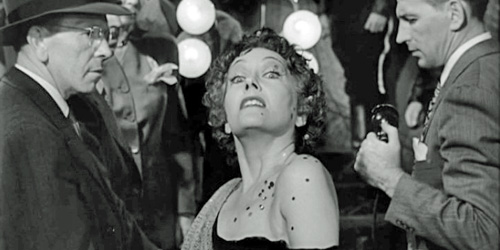Sunset Boulevard (1950)
 Directed by Billy Wilder
Directed by Billy Wilder
Written by Wilder with Charles Brackett (1892-1969), his longtime collaborator.
Widely considered one of the most important films of its era, Sunset Boulevard was nominated for eleven academy awards. It includes some of the most memorable lines in all of the movies (you will probably recognize some of them even if you've never heard of the movie).
The cast includes major parts and cameos by numerous important actors and other Hollywood characters, frequently playing themselves. Among them are: Cecil B. DeMille (director), Hedda Hopper (gossip columnist of famous nastiness), Buster Keaton (actor), Anna Q. Nilsson (actor), H. B. Warner (actor), Ray Evans and Jay Livingstone (songwriting duo).
Like the other great noirs, Sunset Blvd. takes us in to the seedy and bizarre America that lies just below the glossy and placid surfaces of the Post War era. In this case, the main character, Joe Gillis just happens to turn into the driveway of Norma Desmond, and in so doing, drops into a corrupt world of money, delusion, and insanity.
At the beginning of the movie, Joe and Betty Schaefer are both innocent All-American types. Joe has come from Dayton, Ohio to live the American dream in Hollywood. Betty is from a Hollywood family but she is an aspiring screen writer. Both are "good kids." But, both will be drawn into the fantasy of Hollywood. Joe is able to see Nora Desmond's insanity. He has opportunity after opportunity to leave. However, the lure of proximity to fame, power, and wealth keeps him locked in. For both, there are critical scenes in which they declare their allegiance to wealth and delusion.
The film ends with Norma Desmond, descending the staircase, delivering some of Hollywood's most memorable lines. She says "...You see, this is my life! It will Always be! Nothing Else! Just us, and the cameras, and those wonderful people out there in the dark!" We, of course, are the people in the dark, both literally and figuratively. We see the glitzy surface, the happy, conformist, consumer society of the era, not the violence and insanity below the surface.
BTW, Brackett (Wilder's collaborator) was no slouch himself. He won five Academy Awards including a lifetime achievement award and served terms as president of the Screen Writers Guild and of the Academy of Motion Picture Arts and Sciences.
Starring:
William Holden (Joe Gillis) (1918-1981): Holden was a relative unknown when he played Joe Gillis but he went on to be one of the biggest Hollywood stars of the 1950s and 1960s. Holden was close to Wilder and appeared in three other Wilder films after Sunset Boulevard. Some of his other (non Wilder) famous films include: The Bridge on the River Kwai (1957), The Wild Bunch (1969), and Network (1976).
Gloria Swanson (Norma Desmond) (1899-1983): Swanson was a genuine silent era super-star playing a silent era super-star. She was an actress who really did rise to fame in movies directed by Cecil B. DeMille playing an actress who became famous under DeMille's direction. She was also a spectacularly talented individual. She stared in or played in almost 60 films in the silent era. She played in films for Keystone, then Paramount. She was not only one of the most sought after stars of the early 20s but was also a fashion icon. In 1927 she left Paramount for United Artists and began to produce her own films. She wanted to push the boundaries of film making. Her most successful example of this was the 1928 film Sadie Thompson in which she plays a prostitute who becomes involved in a destructive relationship with a missionary. The film was a financial and critical success (but cannot be fully seen today...the essential last reel has been lost). In the late 1930s, Swanson founded a company called Multiprises that officially provided financing and marketing for inventions but the real purpose of which was to help Jewish scientists escape from Nazi Germany. It was reasonably successful. From the late 1940s through the 1960 she appeared frequently on television and she continued to act and appear sporadically almost until her death. And, on top of all that, she was also had a several year long affair with Joseph P. Kennedy Sr. (father of JFK), who was also her business partner on several ventures (she was also married six times). Norma Desmond turned out to be one of Swanson's most famous roles, though she was not Wilder's first choice for it. Several other silent era stars had turned it down. Swanson wrote a very well received autobiography called Swanson on Swanson. A sample tidbit from the book: When she worked with Rudolph Valentino, they had to film both American and European versions of certain scenes because censors in the US would not let a kiss last for longer than ten feet of film. She wrote that this was difficult because "poor Rudy could hardly get his nostrils flaring before the American version was over."
Erich von Stroheim (Max Von Mayerling) (1885-1957): Von Stroheim appears twice in some semesters of this course. As a result, he's got his own (required) page. Access it here.
Reviews:
Roger Ebert (1999) Required.
Next: Short Subjects